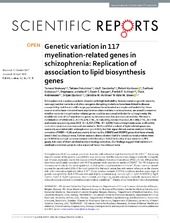Genetic variation in 117 myelination-related genes in schizophrenia: Replication of association to lipid biosynthesis genes
Stokowy, Tomasz; Polushina, Tatiana; Sønderby, Ida Elken; Karlsson, Robert; Giddaluru, Sudheer; Le Hellard, Stephanie; Bergen, Sarah E; Sullivan, Patrick F; Andreassen, Ole Andreas; Djurovic, Srdjan; Hultman, Christina M.; Steen, Vidar Martin
Peer reviewed, Journal article
Published version

Åpne
Permanent lenke
https://hdl.handle.net/1956/18727Utgivelsesdato
2018-05-02Metadata
Vis full innførselSamlinger
Originalversjon
https://doi.org/10.1038/s41598-018-25280-4Sammendrag
Schizophrenia is a serious psychotic disorder with high heritability. Several common genetic variants, rare copy number variants and ultra-rare gene-disrupting mutations have been linked to disease susceptibility, but there is still a large gap between the estimated and explained heritability. Since several studies have indicated brain myelination abnormalities in schizophrenia, we aimed to examine whether variants in myelination-related genes could be associated with risk for schizophrenia. We established a set of 117 myelination genes by database searches and manual curation. We used a combination of GWAS (SCZ_N = 35,476; CTRL_N = 46,839), exome chip (SCZ_N = 269; CTRL_N = 336) and exome sequencing data (SCZ_N = 2,527; CTRL_N = 2,536) from schizophrenia cases and healthy controls to examine common and rare variants. We found that a subset of lipid-related genes was nominally associated with schizophrenia (p = 0.037), but this signal did not survive multiple testing correction (FWER = 0.16) and was mainly driven by the SREBF1 and SREBF2 genes that have already been linked to schizophrenia. Further analysis demonstrated that the lowest nominal p-values were p = 0.0018 for a single common variant (rs8539) and p = 0.012 for burden of rare variants (LRP1 gene), but none of them survived multiple testing correction. Our findings suggest that variation in myelination-related genes is not a major risk factor for schizophrenia.
